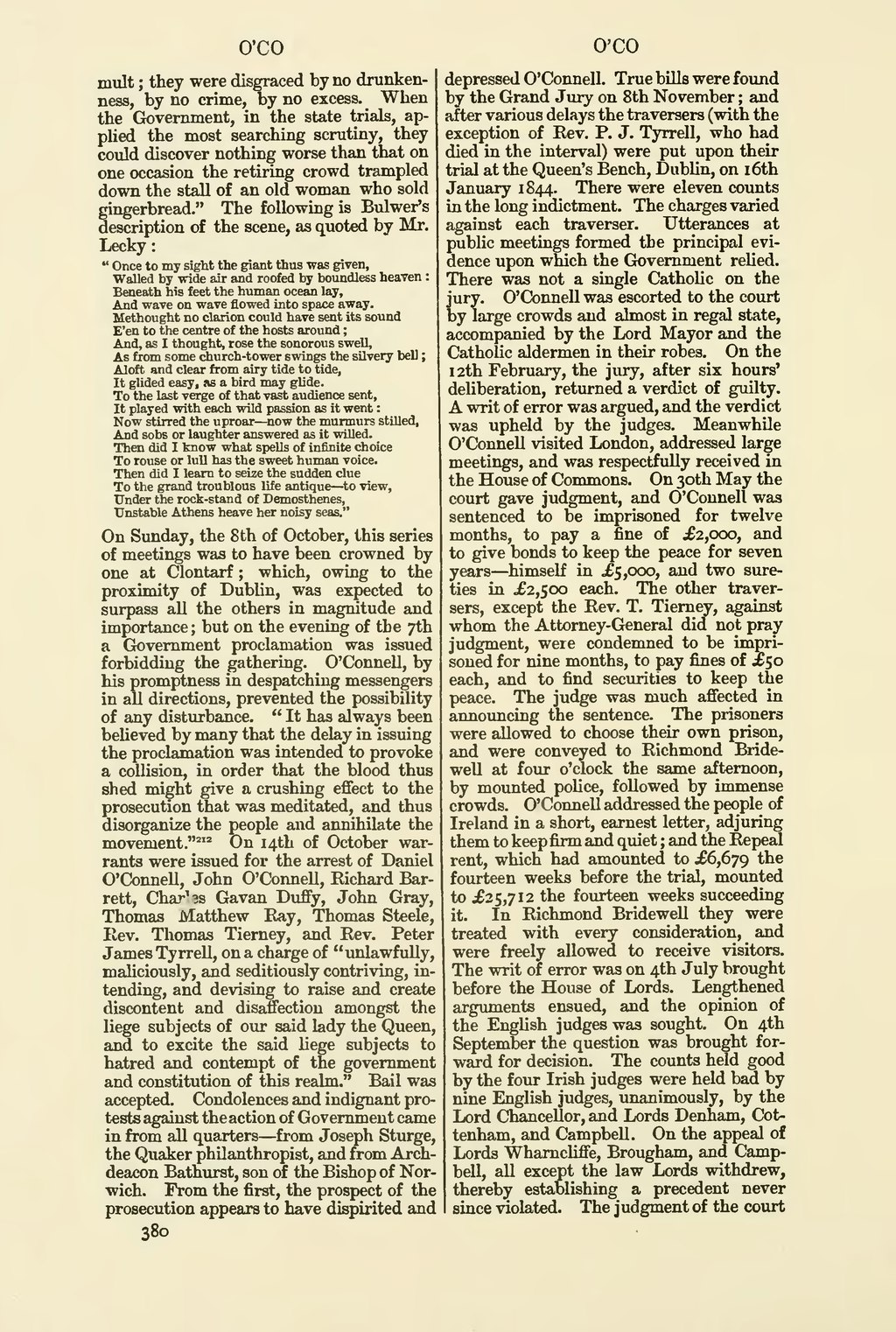mult; they were disgraced by no drunkenness, by no crime, by no excess. When the Government, in the state trials, applied the most searching scrutiny, they could discover nothing worse than that on one occasion the retiring crowd trampled down the stall of an old woman who sold gingerbread." The following is Bulwer's description of the scene, as quoted by Mr. Lecky:
"Once to my sight the giant thus was given,
Walled by wide air and roofed by boundless heaven:
Beneath his feet the human ocean lay.
And wave on wave flowed into space away.
Methought no clarion could have sent its sound
E'en to the centre of the hosts around;
And, as I thought, rose the sonorous swell,
As from some church-tower swings the silvery bell;
Aloft and clear from airy tide to tide.
It glided easy, sis a bird may glide.
To the last verge of that vast audience sent,
It played with each wild passion as it went:
Now stirred the uproar—now the murmurs stilled,
And sobs or laughter answered as it willed.
Then did I know what spells of infinite choice
To rouse or lull has the sweet human voice.
Then did I learn to seize the sudden clue
To the grand troublous life antique—to view.
Under the rock-stand of Demosthenes,
Unstable Athens heave her noisy seas."
On Sunday, the 8th of October, this series of meetings was to have been crowned by one at Clontarf; which, owing to the proximity of Dublin, was expected to surpass all the others in magnitude and importance; but on the evening of the 7th a Government proclamation was issued forbidding the gathering. O'Connell, by his promptness in despatching messengers in all directions, prevented the possibility of any disturbance. "It has always been believed by many that the delay in issuing the proclamation was intended to provoke a collision, in order that the blood thus shed might give a crushing effect to the prosecution that was meditated, and thus disorganize the people and annihilate the movement."212 On 14th of October warrants were issued for the arrest of Daniel O'Connell, John O'Connell, Richard Barrett, Charles Gavan Duffy, John Gray, Thomas Matthew Eay, Thomas Steele, Rev. Thomas Tierney, and Rev. Peter James Tyrrell, on a charge of "unlawfully, maliciously, and seditiously contriving, intending, and devising to raise and create discontent and disaffection amongst the liege subjects of our said lady the Queen, and to excite the said liege subjects to hatred and contempt of the government and constitution of this realm." Bail was accepted. Condolences and indignant protests against the action of Government came in from all quarters—from Joseph Sturge, the Quaker philanthropist, and from Archdeacon Bathurst, son of the Bishop of Norwich. From the first, the prospect of the prosecution appears to have dispirited and depressed O'Connell. True bills were found by the Grand Jury on 8th November; and after various delays the traversers (with the exception of Rev. P. J. Tyrrell, who had died in the interval) were put upon their trial at the Queen's Bench, Dublin, on 16th January 1844. There were eleven counts in the long indictment. The charges varied against each traverser. Utterances at public meetings formed the principal evidence upon which the Government relied. There was not a single Catholic on the jury. O'Connell was escorted to the court by large crowds and almost in regal state, accompanied by the Lord Mayor and the Catholic aldermen in their robes. On the 12th February, the jury, after six hours' deliberation, returned a verdict of guilty. A writ of error was argued, and the verdict was upheld by the judges. Meanwhile O'Connell visited London, addressed large meetings, and was respectfully received in the House of Commons. On 30th May the court gave judgment, and O'Connell was sentenced to be imprisoned for twelve months, to pay a fine of £2,000, and to give bonds to keep the peace for seven years—himself in £5,000, and two sureties in £2,500 each. The other traversers, except the Rev. T. Tierney, against whom the Attorney-General did not pray judgment, were condemned to be imprisoned for nine months, to pay fines of £50 each, and to find securities to keep the peace. The judge was much affected in announcing the sentence. The prisoners were allowed to choose their own prison, and were conveyed to Richmond Bridewell at four o'clock the same afternoon, by mounted police, followed by immense crowds. O'Connell addressed the people of Ireland in a short, earnest letter, adjuring them to keep firm and quiet; and the Repeal rent, which had amounted to £6,679 the fourteen weeks before the trial, mounted to £25,712 the fourteen weeks succeeding it. In Richmond Bridewell they were treated with every consideration, and were freely allowed to receive visitors. The writ of error was on 4th July brought before the House of Lords. Lengthened arguments ensued, and the opinion of the English judges was sought. On 4th September the question was brought forward for decision. The counts held good by the four Irish judges were held bad by nine English judges, unanimously, by the Lord Chancellor, and Lords Denham, Cottenham, and Campbell. On the appeal of Lords Wharncliffe, Brougham, and Campbell, all except the law Lords withdrew, thereby establishing a precedent never since violated. The judgment of the court
